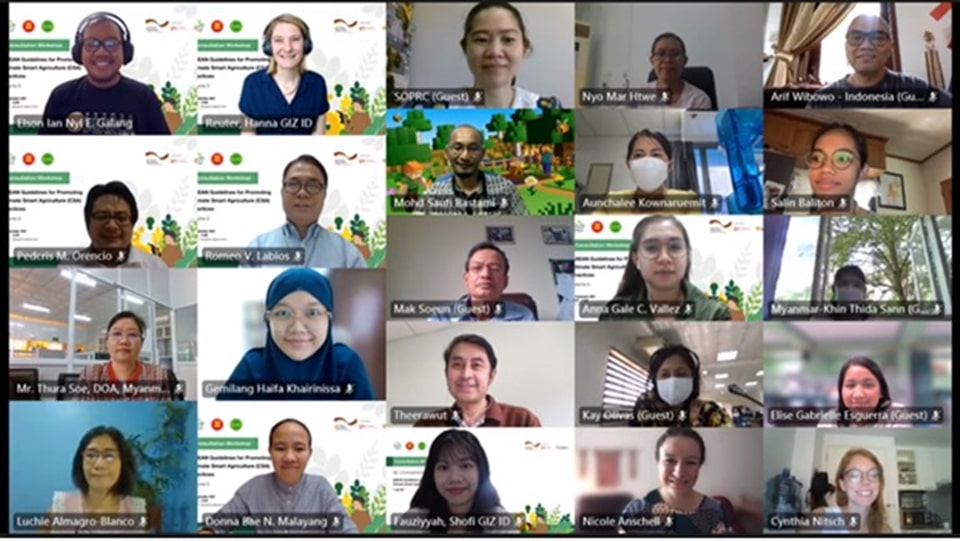On 23 September 2021, the second of the series of consultation workshops was held virtually to discuss the proposed structure and content of the third volume of the ASEAN Regional Guidelines for Promotion and Adoption of Climate-Smart Agriculture (CSA). It highlighted presentations by experts from the Southeast Asian Regional Center for Graduate Study and Research in Agriculture (SEARCA), which co-organized these workshops and led the development of the third volume.
Building from the results and outcomes of the first consultation workshop which emphasized the (1) need for CSA practices at systems-level and (2) tangible guidelines for prioritization and implementation of CSA for ASEAN Member States (AMS), this second workshop was held with the following objectives:
- Validate CSA approaches at the systems-level based on a survey conducted by SEARCA
- Present the annotated outline of Volume 3 and get feedback from the AMS
- Determine national or regional policies for implementation and scale-up of CSAs in the region.
For the first objective, Mr. Elson Galang, technical specialist, presented the results of the regional survey to gather feedback on the three pre-identified systems level CSA approaches that can be potentially included in the third volume namely: (1) Climate-Smart Villages (CSV) as an example of CSA for agroecological systems, (2) Direct Seeded Rice (DSR) as an example for value chains, and (3) Climate-Smart Mapping and Adaptation Planning (CS-MAP) as an example of digital system.
Mr. Galang noted how there was positive feedback to include these CSA approaches in the third volume. Moreover, he presented two additional CSA approaches, identified through learning events and consultations, that can be included namely: (1) Low Emission Animal Production Systems (LEAPS) as an example for animal systems and (2) Community-based Forest Management (CBFM) for forestry systems.
Dr. Romeo V. Labios, agronomist and SEARCA lead expert, presented the annotated outline of the third volume. He underlined the proposed four chapters including:
- Chapter I. Participatory Approach in Prioritization of CSA Approaches
- Chapter II. Five Suggested Principles for the Promotion and Adoption of CSA Approaches
- Chapter III. Selected Success Stories of Climate Smart Agriculture Approaches Chapter IV. Partners, Coordinating, and Implementing Institutions for CSA Across Scales
Dr. Labios focused his presentation on the first two chapters. For the first chapter, he talked about the different assessment guides that the AMS could adopt to identify which CSA approaches they could prioritize. This includes assessments of (1) CSA interventions and their contributions to the three CSA pillars, (2) implementation feasibility, (3) adoption barriers, (4) incentive mechanisms, and (5) key implementation players.
For the second chapter, he presented the suggested five principles to operationalize promotion and adoption of CSA approaches that revolve around (1) creating scales, (2) availability and access to CSA financing, (3) educating producers and consumers, (4) digitalization, and (5) policy and governance.
Addressing the third objective of the workshop, Dr. Pedcris M. Orencio, Head of SEARCA’s Research and Thought Leadership (RTL) Department, discussed important aspects of policies on CSA in the region. He highlighted the ASEAN Guidelines on CSA’s contribution to building the resilience of the AMS, through five sustainability elements namely, (1) finance and investment of the government and the private sector, (2) capacity building of institutions to mainstream their existing roles and responsibilities, (3) IEC, advocacy sharing, and networking, (4) infrastructure such as ICT, digital infrastructure services, platforms, and technologies, and (5) research development.
AMS can reflect content of the guidelines when (1) developing policies, strategies, and national programs, (2) conducting training, workshops, and exchange formats, and (3) adapting local guidelines. All of these contribute to the three objectives of CSA which are increased productivity, increased resilience, and reduced GHG emissions. Related to climate governance he noted about the remarkable contribution of ASEAN-CRN for facilitating collaboration and consensus-building on regional level climate actions.
After the presentations, a breakout session followed where participants were divided into three rooms. Each room allowed participants to provide inputs and further comments on a specific chapter they were assigned with. Reporting back to the main room then followed which highlighted some of the key points below:
- For Chapter I, the participants generally found that the indicators included in the assessment guide are already enough. However, there was a call to provide more attention to the livestock sector.
- For Chapter II, the participants agreed that the suggested principles are comprehensive enough. Some important reminders were underlined including the need for implementing agencies to complement each other to lessen tradeoffs (Principle 5: Policy and Governance).
- For Chapter III, the participants validated the results of the survey and the presentation to include the five CSA approaches at the systems-level. However, there was a strong call to include CSA approaches related to fisheries and/or aquaculture.
Insights from these workshops will serve as a basis for the development of the third volume. As the next steps, SEARCA will prepare the first full draft of the guidelines based on the discussed annotated outline.
The workshop is participated in by ASEAN-Climate Resilience Network (CRN) members, national focal points from the ASEAN Technical Working Group on Agricultural Research and Development (ATWGARD) and other selected ASEAN sectoral bodies, representatives of development agencies, and research institutions. It was hosted by the Malaysian Agricultural Research and Development Institute, also acting as this year`s Chair of the ATWGARD, on behalf of the ASEAN-CRN.
This development process, including the conduct of these workshops, is supported by the project “Climate-Smart Land Use in ASEAN” (CSLU), financed by the German Federal Ministry for Economic Cooperation and Development (BMZ) and implemented by GIZ.
 Participants of the 2nd Regional Consultation Workshop.
Participants of the 2nd Regional Consultation Workshop.